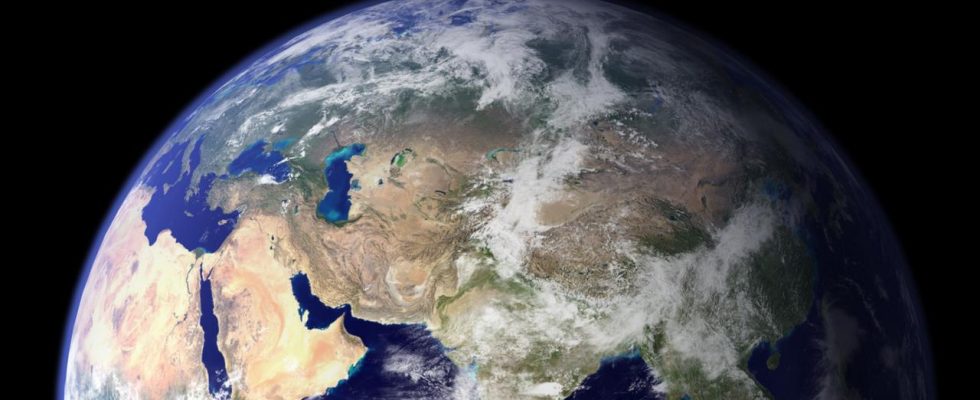context
Only a few Germans deny climate change anymore. Instead, climate disinformation is primarily intended to delay necessary climate protection measures. The motivations are diverse.
“Top scientist drops bombshell: Overwhelming consensus is that the climate crisis is made up”, “Nature exposes climate hoax” or the “climate hoax” is “a fraud, a sale of indulgences, a pretext to rob us and lead us into socialist slavery lead”. All of these are statements from current posts on the short message service X.
There are currently numerous posts under the hashtags #Klimaschwindel and #ClimateScam that put climate change into perspective, question it or even deny it. There appears to have been an increase in such contributions around the UN Climate Change Conference in Dubai. They are in complete contradiction to climate science, because it is believed that current climate change is almost entirely due to anthropogenic factors widespread scientific consensus.
Climate disinformation is booming
A Preliminary report on COP28 The Climate Action Against Disinformation (CAAD) coalition, a global coalition of more than 50 climate and disinformation organizations, concludes that both climate misinformation and disinformation are booming. They aim to undermine public and political support for action and are particularly widespread when extreme weather events such as forest fires occur or important climate decisions are being discussed, such as at the World Climate Conference.
“Such content not only impacts the debate and implementation of climate policy, but also turns climate into a vehicle for conspiracy theories, scapegoating and social division,” the study says. The United Nations also holds one Position paper from June 2023 states: “Misinformation about the climate emergency is delaying urgently needed action to ensure a livable future for the planet.”
The takeover of Elon Musk’s short message service made it loud an analysis by the Center for Countering Digital Hate (CCDH) and CAAD a sharp increase in climate disinformation since July 2022. The number of climate change denying content on X tripled compared to previous months to almost 110,000 tweets per week.
According to the CAAD analysis “Denial, Deception, Delay”, the hashtag #ClimateScam has been spreading extremely successfully on X since December 2022 and has enabled explicitly climate-denying content to make a comeback. Especially in relation to extreme weather events, the hashtag was used so often worldwide that it trended on X several times. In Germany, the hashtags #Klimaschwindel and #ClimateScam were often used in connection with posts from, among others daily News accused of manipulating weather maps. A recurring claim that has already been refuted several times.
Hard climate deniers in Germany are now only a small fringe group
However, according to CAAD, the success of the hashtag #ClimateScam can be attributed to a small group of accounts that use the hashtag regularly and receive thousands of likes and retweets for their content. Toralf Staud, specialist journalist at Knowledge portal klimafakten.deconfirm: “The hard deniers are now a tiny fringe group.”
Cases of classic denials of man-made climate change have now become quite rare in this country. However, they would become louder before events such as the climate conference in order to appear larger and influence possible decisions. However, the majority of people in Germany know that climate change is a big problem and are therefore demanding climate protection measures from the government, said Staud.
According to a survey by the Federal Environment Ministry and the Federal Environment Agency, 91 percent of those surveyed support more efforts in climate protection. 85 percent of those surveyed said they were already noticing the effects of climate change through drought and drought, and 83 percent also saw heavy rain and floods as consequences.
Key claims against climate change
But the spread of misinformation and disinformation about climate change involves significantly more argumentation patterns and strategies than pure denial. In the paper “Computer-aided detection and classification of climate change misinformation” lists five key claims: “Global warming is not happening,” “Human greenhouse gases are not causing global warming,” “Climate impacts are not bad,” “Climate solutions don’t work,” and “The climate movement/science is unreliable.” .
This is often done following rhetorical tricks applied: the use of pseudo-experts, the use of logical fallacies, the creation of unattainable expectations, cherry-picking and the spread of conspiracy myths.
Patterns of argument to delay climate protection
Staud also says that attempts to delay climate protection are now much more common than denying climate change. The Mercator Research Institute on Global Commons and Climate Change (MCC) has published a study the argumentation patterns of opponents of measures divided into four main categories: “For example, responsibility is diverted, inadequate measures are propagated, negative side effects are emphasized or claims are made that it is no longer of any use anyway.” Staud summarizes these categories with the slogan: “Not me. Not now. Not like that. Too late.”
Passing on responsibility for climate change is a very common narrative. “For example, people point to other countries with higher CO2 emissions and say that these countries should do something first,” says Staud. This pattern of argument can be seen, for example, in the recurring claim that Germany is only responsible for a small proportion of CO2 emissions worldwide and that further climate protection measures are therefore virtually pointless. However, this applies to almost all of the almost 200 countries in the world.
“If all states argued like that, nothing would change,” says Staud. In addition, in terms of population, Germany emits significantly more CO2 than the global average.
Waiting for new technologies is another popular argument. For example, the current options for climate protection measures are declared not good enough and advocates for maintaining the status quo until supposedly better technologies are available. However, according to climate researchers, emissions must be drastically reduced immediately to avoid the harshest consequences of climate change, and not just in a few decades.
Poorer countries particularly affected by climate change
By pointing out the negative consequences for poor people, the supposed harm of climate protection measures is to be pointed out. “This argument often comes from people who are not otherwise very committed to social justice,” says Staud. “In addition, it helps poor people much less if no climate policy is made – because they will suffer the most from the consequences of unchecked climate change.”
On the one hand, this applies globally: Because so far there are according to the Intergovernmental Panel on Climate Change (IPCC) People from poor countries are particularly affected by the consequences of climate change. The regions at particular risk include West, Central and East Africa, South Asia and Central and South America. Mortality there caused by weather extremes such as floods, droughts and storms was 15 times higher than in the rest of the world between 2010 and 2020.
But it is not just from a global perspective that poorer people are more affected by the consequences of climate change: the financial situation also plays an important role in Germany. Poor people often live in insufficiently insulated apartments in densely built-up urban areas, and heat waves hit them particularly hard. “Of course, climate policy must be constructed in a socially balanced way,” says Staud. “But doing nothing would be the wrong thing to do and would help poor people even less.”
According to MCC, the fourth overarching argument pattern is surrender. As a result, it is already too late to stop climate change and we can therefore leave off implementing further climate protection measures. However, that is completely wrong, says Staud. Every tenth of a degree of heating avoided is important. If the 1.5 degree limit is broken, about two degrees would still be better than 2.1 degrees. In any case, it is never too late to reduce emissions.
“Alarming mobilization towards violence”
Globally, according to CAAD 2023, there has been an “alarming mobilization toward violence against those associated with climate action – from elected officials and policymakers to scientists, activists and journalists.” A study by the international non-governmental organization Global Witness says 39 percent of the 468 climate scientists they surveyed have experienced online harassment or abuse in the past few months.
“All those people are considered targets for this kind of information warfare,” Jennie King, head of climate research and policy at the Institute for Strategic Dialogue (ISD), told AFP. This suggests that anyone who is associated with climate policy or climate protection measures is increasingly being made a scapegoat.
motivation different
In its study, the CAAD identifies three key players in the dissemination: the fossil fuel lobby, state-backed actors and those who benefit from the “outrage economy” online. In addition, there have recently been “wellness” and health influencers.
“Especially when it comes to delay arguments, there are senders with very different motivations. Some want to prevent climate protection, others may simply be unsure about the economy, even if they take climate change very seriously,” adds Staud. It is therefore important to find the right address for individual concerns.
Overall, however, according to Staud, psychological reasons are most important when understanding why people deny the climate crisis or want to delay climate action. “It is attractive to look for the arguments that speak against far-reaching measures. Because facing reality is very uncomfortable on this topic.” Nobody wants to be a bad person – but if you tell people that they are destroying the climate, it initially causes a defensive reaction.
“It is not a lack of information that some people continue to delay climate action,” says Staud. “There are psychological factors that play a role. That’s why there will always be people who don’t want to admit it – perhaps because they benefit from the status quo, perhaps because their self-image would otherwise be shaken, perhaps because they subconsciously want to avoid feelings of fear that would arise as soon as they accepted the reality of the climate crisis.”


